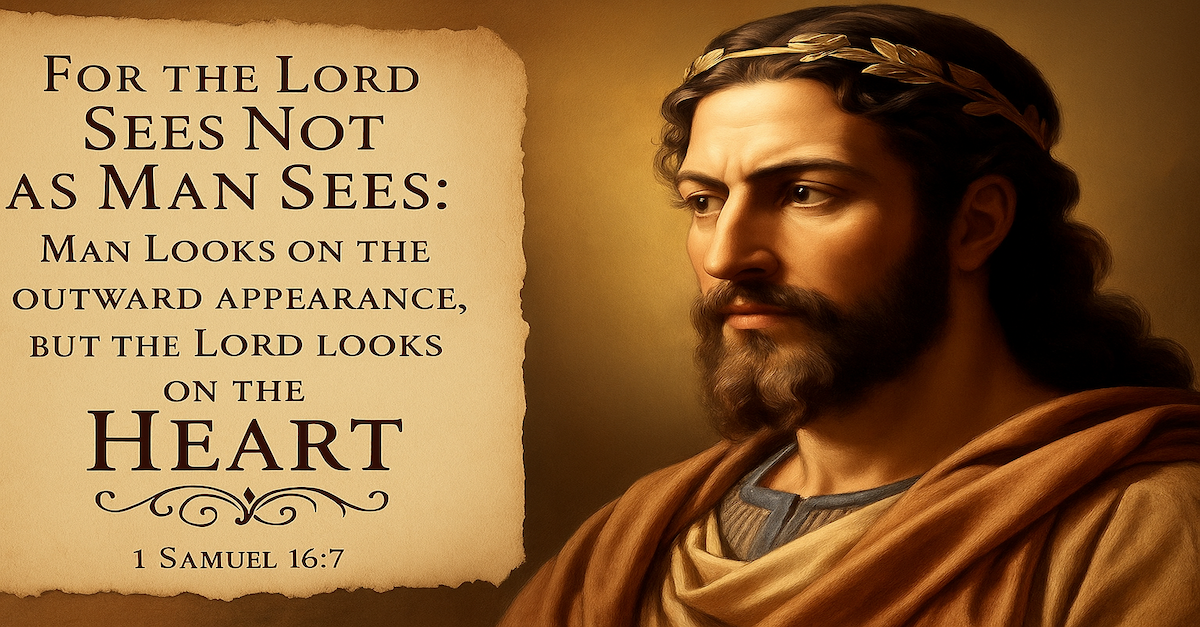Most children’s Bible storybooks will include the story of David and Goliath. A younger man or teen, David stands against a fearsome giant. The massive Goliath had armor and bladed weapons; David only held a slingshot with a few stones. David’s victory over Goliath teaches a lesson in faith and courage. He saved God’s people and became a major redemptive figure in God’s story.
King David was ancient Israel’s second king (c. 1000 BC)—a shepherd turned warrior who defeated Goliath, unified the tribes of Israel, and made Jerusalem the capital. Composer of many Psalms and recipient of God’s Davidic covenant, David is a key ancestor of Jesus. Though he sinned greatly, David’s repentance shaped his enduring biblical legacy as a "man after God's own heart."
How and Why Did God Choose David?
God chose David to be king of Israel for two reasons. First, the first king, Saul, disobeyed God’s commands, especially by offering sacrifices reserved for the priests and sparing the Amalekite king and animals. God had ordered their complete destruction (1 Samuel 13, 15). Because of this rebellion, God sought a new king with the right heart, leading us to the second reason: David was such a man (1 Samuel 13:14).
A shepherd boy from Bethlehem-Judah, David was the youngest son of Jesse. When Samuel came to Jesse’s house by God’s guidance to anoint a new king, no one thought to invite David. But God directed Samuel to find David and not to look at the outside. God knows the heart (1 Samuel 16:7), and David had the right one—a worshipper and warrior-protector.

The battle with Goliath exposed David’s heart and faith. Goliath challenged the army of Israel, and they cowered in fear. But David accepted the challenge. He trusted in God’s purpose and power, not in armor or weapons. Saul offered his own personal armor, but David rejected it, trusting in what he knew, the slingshot. Declaring and living the truth, “The battle is the Lord’s” (1 Samuel 17:47), David won a victory over Goliath.
After Goliath, David became a leader of the Israelite army, beating enemies like the Philistines. He also won fame and the respect of the people, and even married Saul’s daughter. However, David’s success was tied to his faithfulness to God, his obedience, and how he wholeheartedly worshipped God. God gave favor and chose a shepherd with integrity to lead the promised Israel.
God values the heart and who we are within more than outward appearance. The Father continues to choose leaders who trust him and walk in humility and spiritual dependence. In this, we fulfill our purposes and callings.
David’s Exile
After David defeated Goliath and became famous in Israel, Saul grew jealous. Samuel had prophesied over Saul how God would choose a new king and Saul would lose his position. So he saw David as a threat. Saul tried to kill David several times, forcing David to run away for his life, hiding in caves and other lands for years (1 Samuel 18-26). However, God used this time to teach David powerful lessons.
During exile, David didn’t come to power by his own action. He refused to, trusting that God’s timing would bring the anointing to fulfillment. David had opportunities to kill Saul, but he didn’t. David learned patience, humility, and how to lead reliant upon God’s plan.
While on the run, David attracted a certain type of follower. They weren’t high class Israelites, but those distressed, in debt, or discontented (1 Samuel 22:2). These people were outcasts, but David trained them into mighty warriors and amazing leaders. He built a community of faith and shared purpose. Through struggle, he earned their loyalty, giving them hope and ownership.
David also relied on prayer and spiritual guidance. Saul killed most of God’s priests, but one escaped, Abiathar. David asked for God’s word through the priest and followed the Lord’s guidance, even when it was difficult. Through these trials, David grew as a leader whom God could trust with his people.
God often does this, raising up people in obscurity before revealing them as his anointed. We can point to Joseph in Genesis or even Jesus for thirty years before he began his ministry. God leads his chosen people through wilderness experiences to teach us how to trust him alone, building our character of faith, becoming the people we need to be to fulfill his promises in our lives.
The Early Years of David's Reign
After Saul’s death at the hands of the Philistines, the tribe of Judah anointed David as their king in Hebron (2 Samuel 2:4). The rest of Israel, however, followed Saul’s son, Ish-bosheth. For seven years, David fought a civil war between Judah and Israel. Because of God’s favor, David increased in power while Saul’s house weakened. Eventually, Ish-bosheth died, and the rest of Israel asked David to be king, recognizing his leadership (2 Samuel 5).
But Israel remained a divided, tribal people, so David made a politically brilliant move. He chose a new capital, one controlled by the Jebusites and not any tribe of Israel—Jerusalem. That city had remained unconquered for centuries, resisting Israel’s military. David did the seemingly impossible and conquered it, making it his capital. Jerusalem became the City of David, a central location perfect for unifying the nation. David also brought the Ark of the Covenant back from its exile. It had been absent for decades, not in the Tabernacle, and David set up a new tent for it in Jerusalem. With great celebration, David had the Ark carried to Jerusalem and established night and day worship before it.
Militarily, David experienced major victories. He defeated the Philistines, Moabites, Edomites, Syrians, and Ammonites. David expanded Israel’s borders, always asking for God’s wisdom before battles, giving the Lord credit for every success. This brought peace and prosperity to the kingdom. David’s leadership transformed Israel into a powerful and influential kingdom.
Unfortunately, the later years of his reign proved fraught with conflict and tragedy.
David’s Later Years
Sin derailed David’s peace and success in Israel. David saw a woman, Bathsheba, bathing, and committed adultery with her. When she became pregnant from the encounter, David organized the death of her husband, Uriah, to cover up his sin (2 Samuel 11). The prophet Nathan exposed the sin. David repented, but the child with Bathsheba died. God forgave David, but Nathan prophesied how the sword wouldn’t depart from his house as a consequence (2 Samuel 12:10). David’s sin impacted his family and the rest of his reign.
David’s son, Absalom, avenged his sister Tamar, who was raped by another brother. Later, Absalom rebelled against his father, declaring himself king with the support of much of Israel’s leadership. David fled Jerusalem. David wanted to spare Absalom’s life, but in the ensuing battle, Joab the general killed Absalom. David grieved and mourned as a father and a king (2 Samuel 18:33). Another rebellion had to be put down soon after (2 Samuel 20).
Years later, motivated by pride, David sinned again by ordering a national census. A census would measure his success and power, but such a thing was against God’s law unless done under specific conditions (Exodus 30), which David didn’t have. God brought judgment against Israel through a plague, and David repented, building an altar to God on Mount Moriah. The plague stopped, and Solomon later built the Temple there.
Despite these issues, David’s reign laid the foundation for future success. He made plans for building the Temple, giving the design and resources to his son, Solomon. Before he died, David officially appointed Solomon as king, encouraging him to be obedient and honor the covenant with God.
Ultimately, the greatest work of God through David was the covenant to redeem the world through a king.
How God Would Bring Redemption through the Davidic Covenant
During the time of the prophet Samuel, Israel asked for a king like the other nations. However, they already had a king, God himself, so this request rejected God’s rule (1 Samuel 8:7). Israel wanted to put their trust and hope in a human leader rather than God. Though this angered God and grieved Samuel, God let them have a king, Saul. Saul’s rebellion revealed the weakness of human leaders.
So God decided to choose a new king, starting a new lineage, from a man after his own heart. While this initially meant David, God had another greater purpose for this new lineage. The Lord established a covenant with David to bring the rule and reign back to God and redeem all humanity. God promised David an eternal house, kingdom, and throne (2 Samuel 7:12-16). The Davidic Covenant became the foundation of the Messianic prophecies. Over time, the line of Judah failed and rebelled. But the prophets revealed more about the promise to David, writing and speaking about a future king who would reign in righteousness, bring peace and justice forever (Isaiah 9:6-7; Jeremiah 23:5-6), not only to Israel but to all nations, connecting the Messiah with the Abrahamic Covenant, as well (Genesis 12). The Old Testament ends with this promise unfulfilled, still waiting for the promised Son of David.
The Gospels announce Jesus as the fulfillment of the Davidic Covenant. Born in David’s lineage (Matthew 1:1), Jesus came to reign as king, not of Israel alone but of all people, politically and spiritually. Christ declared the now and future arrival of the Kingdom of God, and he invites salvation into that kingdom through his death and resurrection. Through Jesus, God himself becomes king again, not from human plan but through the Father’s redemptive plan.
The Davidic Covenant redeems Israel’s rejection into a greater transformation for all who would believe. God used David to promise a king who would reveal the Lord to the world, to every nation, tribe, and tongue. Jesus, the Son of David and Son of God, reigns eternally and offers us a place as God’s child to inherit his kingdom of justice, mercy, and grace.
Peace.
Image created using DALL.E 2024 AI technology and subsequently edited and reviewed by our editorial team.


.jpg)


